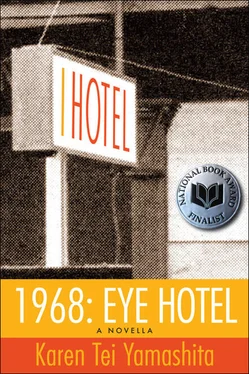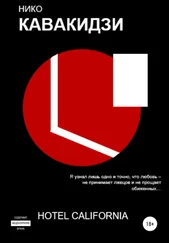The JACLer puffed in the air away from the half-eaten slices of apple pie and nodded appreciatively to Edmund.
The president adjusted his bifocaled vision, scrutinizing his crowd in various dispositions of alertness. “You of the Japanese American Citizens League have an important history and mission to communicate. If the youngsters outside could hear your brave history and mission, they would join your ranks and extend your proud history.” This comment brought about some grunting and scattered clapping. The youngsters outside had gotten their puppet into a kneeling position with a knife stuck in his belly.
Inside, the president continued. “If you fail to communicate or become stagnant in your thinking, if you lose your ability to think toward the future, this league is doomed to pass away without change.” He paused to let the doom of it all sink it.
Edmund jotted down with some glee: Nisei dinosaurs. Extinction.
“But”—the president wagged a telling finger—“I know that the JACL is an association that knows great change, and you have not and cannot be afraid of change. After all, you survived World War II.” More grunting and clapping. “But think about one of the reasons you survived the war—”
Edmund panned the room, wondering what these second-generation Japanese Americans could be thinking.
“English,” the professor announced. “As nisei you were able to speak English and communicate your concerns to the American government. The English language: a small thing we take for granted, but a key to our survival. Your ability to communicate effectively in English binds you to your American citizenship.”
Outside, the poor puppet protested, “Ouch ouch!” while the crowd cried out the Japanese translation, “Itai itai! Aiyaiyaiyai, itai yoooo!”
Someone tilted his head toward Edmund, to which Edmund responded while trying to keep an ear on the president’s speech. “Do you speak English?” the nisei asked Edmund.
“Pardon me, sir?” Edmund tried a British accent on the man. It was a reflexive response, a haughty survival tactic learned on the job. Edmund caught himself; maybe this guy had taken the president’s words to heart and wanted to bind his English to their shared American citizenship.
But the nisei replied with controlled agitation, “Ah, the toilet, the men’s room?”
“Yes sir. Right this way, sir.”
Edmund ushered the man out. Beyond the doors of the banquet hall, the ruckus was a low roar. Police were stationed at the entrance, and clients slipped in and out with amused babble or testy exchanges, the din rising and falling into the foyer. Edmund thought he saw Paul with his picket sign but ran back to hear the president’s closing remarks.
“Now I’m not talking about change for the sake of change, but about progress, progress that is a forward-thinking process of time-binding in which we pool all of our technical and intellectual resources and support the freest cultural exchange between all races and creeds and classes for the purpose of solving the world’s problems.”
At this moment, the puppet sewn from rags was splitting its guts. Long red ribbons sailed into the foggy night, flung across the wharf with spraying clouds of sparkling crimson confetti. The poor puppet heaved his entrails over the dancing protestors in a bizarre display, an Oriental Mardi Gras.
As the JACLers rose to applaud their speaker, Edmund ran into the kitchen, positioning himself at the salad bar to accost the acting president as he moved quickly along with his entourage.
“Sir, Mr. President.” Edmund stood in the narrow aisle and called out like a reporter.
The voice, coming from the bins of lettuce and tomatoes, caught the president’s attention. Who was this young waiter?
“I listened to your speech with great interest.” He fumbled quickly with a pertinent question. “I was thinking, won’t it be necessary to promote a civilization of people who speak multiple languages in order to translate and exchange ideas and technology?”
“An excellent question. Who are you?”
“Edmund Lee. I’m a student at your college.”
The president nodded to his nisei bodyguards. “This is what I’m talking about. Intelligent and hardworking students like this young man. Studying by day, working by night. That’s what we’re about, not that minority of rabble-rousers.” He patted Edmund on his padded white jacket shoulder. “Ed, come to my office and we’ll talk about your question. But tell me just one thing: what did you learn tonight?” He began to walk on, pushed along by his bodyguards.
Edmund, following, ventured awkwardly, “Well, I think you said that the winning civilization will be the one that keeps its history going.”
They climbed the stairs to the roof, and Edmund could hear the deafening roar of propellers. The president placed his hand over his tam-o’-shanter and looked back at Edmund, yelling something incomprehensible, his mouth a grin and a grimace at the same time, then ducking away into a whirring fog, tiny bits of crimson confetti glinting here and there.
“Fuck,” Paul exclaimed. “I can’t share that byline with you.”
“Why not?”
“I was outside. You were inside.”
“So? That’s the beauty of it.”
“My participation is about ten percent. The whole article is yours. And besides, who reads his work? Now you’re inside his goddamned head.”
“Pretty weird, huh?”
Paul read from Edmund’s draft. “‘To paraphrase the president, he states that conflict is essential to growth, but unresolved conflict over time results in emotional disturbance (i.e., you become crazy) as one’s self-concept departs from the reality of the self. Your territory separates from your map.’” Paul looked up from his reading. “What’s this map/territory thing?”
Edmund’s face scrunched up. “It isn’t very clear yet, is it? O.K., it’s like the territory is the real land and the map is just a representation. So you got a map in your head about yourself, but there is the real you or self that is the territory. So this conflict he’s talking about is when the territory is changing but the map stays the same. It’s this disconnect between the two, between the abstraction and the reality, that causes one to be insane.”
“That makes sense,” Paul nodded. He was thinking about how he himself could be defined as insane, but he read on: “‘The man’s entire body of scholarship—ideas that can be said to be largely utopian—has been demolished by his actions. His map is that he’s an effective communicator, a great scholar applying his theories to active duty. His territory is that of a convenient minority banana used by the white power structure. Even if that’s an exaggeration, his recent displays of buffoonery and arrogant affectations take on that role. He’s abandoned his principles of human dignity and self-concept to play the fool. So even by his own terms, he’s insane.’”
Edmund started to pull his jacket on. “I’ve got to revise this for the paper. What do you want to do?”
“It’s not my article, Edmund.”
“Yeah, I better take full responsibility. Probably nobody will read it anyway.”
“It’s brilliant, really. Only you would do that sort of homework.”
“I’ve got these photos that Professor Chen took that I’m going to use. He’s got the students being handcuffed, lines of police with batons, injured students, blood on the concrete, teachers marching with armbands, paddy wagons.”
“Talk about the territory,” Paul scoffed.
“Exactly.” Edmund stood in Paul’s living room, staring for a long moment at an oil portrait of a mustachioed man in a suit and tie, his tilted head and ochre colorings against the brushstrokes of an olive green background.
Читать дальше












